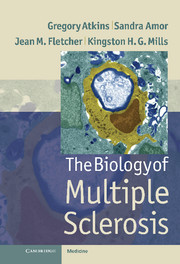Book contents
- The Biology of Multiple Sclerosis
- The Biology of Multiple Sclerosis
- Copyright page
- Contents
- Contributors
- Preface
- Chapter 1 Introduction: the biological basis
- Chapter 2 Neuropathology of multiple sclerosis
- Chapter 3 Experimentalautoimmune encephalomyelitis
- Chapter 4 Immunologyof MS
- Chapter 5 Animalmodels based on virus infection
- Chapter 6 Viruses in the etiology of MS
- Chapter 7 Epilogue: conclusions and future directions
- Index
Chapter 1 - Introduction: the biological basis
Published online by Cambridge University Press: 05 December 2012
- The Biology of Multiple Sclerosis
- The Biology of Multiple Sclerosis
- Copyright page
- Contents
- Contributors
- Preface
- Chapter 1 Introduction: the biological basis
- Chapter 2 Neuropathology of multiple sclerosis
- Chapter 3 Experimentalautoimmune encephalomyelitis
- Chapter 4 Immunologyof MS
- Chapter 5 Animalmodels based on virus infection
- Chapter 6 Viruses in the etiology of MS
- Chapter 7 Epilogue: conclusions and future directions
- Index
Summary
- Type
- Chapter
- Information
- The Biology of Multiple Sclerosis , pp. 1 - 10Publisher: Cambridge University PressPrint publication year: 2012

